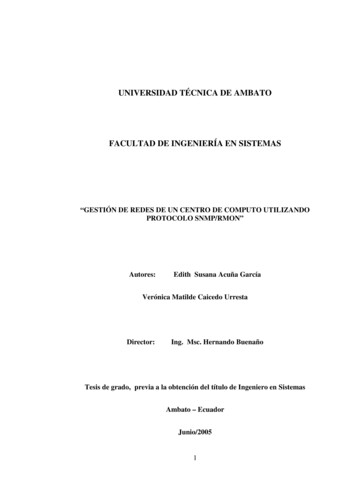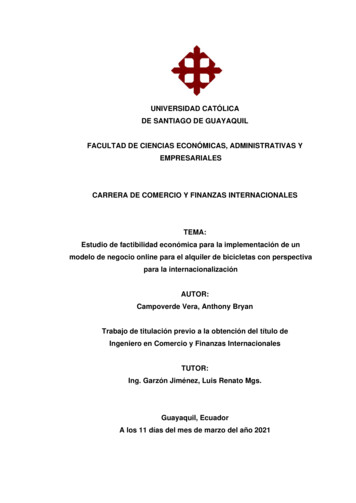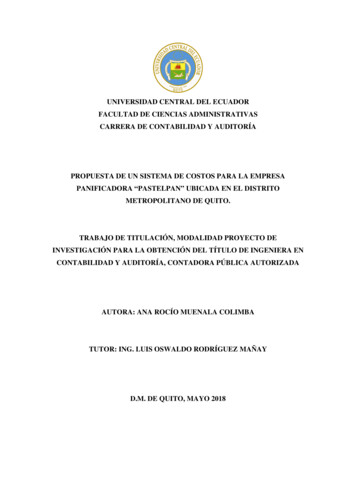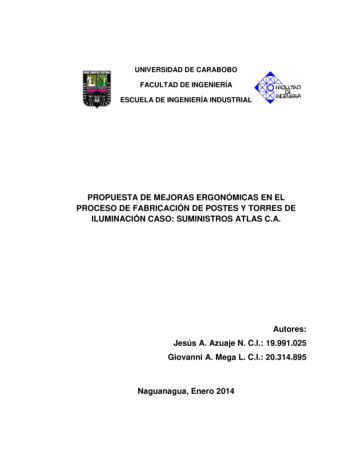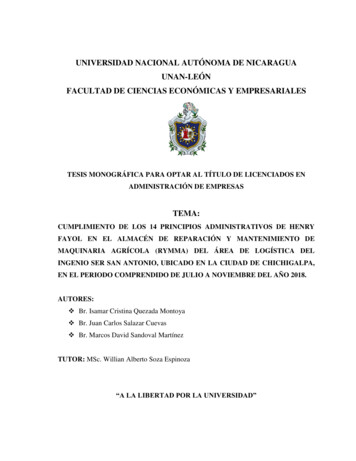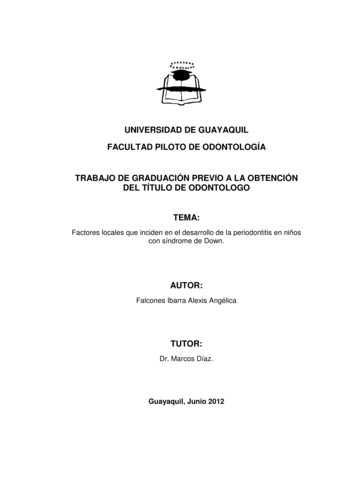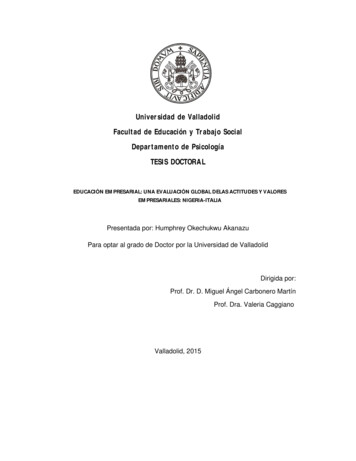
Transcription
Universidad de ValladolidFacultad de Educación y Trabajo SocialDepartamento de PsicologíaTESIS DOCTORALEDUCACIÓN EMPRESARIAL: UNA EVALUACIÓN GLOBAL DELAS ACTITUDES Y VALORESEMPRESARIALES: NIGERIA-ITALIAPresentada por: Humphrey Okechukwu AkanazuPara optar al grado de Doctor por la Universidad de ValladolidDirigida por:Prof. Dr. D. Miguel Ángel Carbonero MartínProf. Dra. Valeria CaggianoValladolid, 2015
II
ACKNOWLEDGEMENTMy unalloyed gratitude goes, especially, to the Department of Psychology at theUniversity of Valladolid for allowing me to present and defend this thesis.This research paper is made possible through the help and support of respected personsand institution. My special thanks goes to the Director of this PhD programme, Prof.Miguel Carbonero, who has relentlessly stood by me through out the period of myresearch and studies for this thesis. He kindly read my paper and offered invaluabledetailed advices on grammar, organization, and the theme of the paper.I also remain ever grateful to Prof Valeria Caggiano through whose instrumentally I gotthe opportunity to do this PhD. She has committedly walked me through the wholeprocess of my studies, research and academic career. She read my thesis and providedvaluable advices.I thank Prof Antonio Ragusa and Rome Business School who have consistentlysupported me financially throughout the course of this research. I also thank all thosewho responded to my Survey during the gathering of the data for the research. I amgrateful for the moral and financial support of my Family: Mrs S.N Akanazu, Placid,Kelechi, Ikechi, Chijioke, and Chioma. I also extend my thanks to my Uncle Mr DenisMpumechi and all my friends and colleagues in Management Consultancy for theirconstant support.III
TABLE OF CONTENTAknowledgement . .IIIList of Tables . VIIList of Figures .VIIIList of Graphics . .VIIIResumen . .IXAbstract . . .X1.0.INTRODUCTION OF THE STATEMENT OF THE PROBLEM .XI2.0.GENERAL INTRODUCTION . .XI3.0.GENERAL STATEMENT OF THE PROBLEM . .XIIIPART I: THEORETICAL PARTCHAPTER 1: THEORETICAL BACKGROUND ON ENTREPRENEURSHIPEDUCATION . 2Introduction . . 21.The Nature of Entrepreneurship . .22.General Objectives Of Entrepreneurship . .72.1. New Business Creation . . . .82.2. Innovation .82.3. New Job Creation and Employment Generation .102.4. Creation of Social Justice . .102.5. Wealth Creation . .102.6.Linkages and Integration Effects .113.0Types Of Entrepreneurship . .113.1.Corporate Entrepreneurship . 123.2.Social Entrepreneurship .133.3.Knowledge Entrepreneurship . 143.4.Technology entrepreneurship . .144.0General Characteristics of an Entrepreneur .165.0EntrepreneurialMindset . .205.1Characteristics of Entrepreneurial mindsets . .22IV
5.1.1 Necessity And Opportunity Driven Entrepreneurship . 225.1.2 Improvement Driven Entrepreneurship . .225.1.3 Growth Led Entrepreneurship . .245.1.4 Innovation Driven Entrepreneurship . .246.0What is Entrepreneurship Education?.256.1Literature Review . .266.2Aims And Objectives Of Entrepreneurship Education . . 296.3Skill Acquisition and Entrepreneurship Education (A Two Way ContinuousDevelopment Curriculum) . 32Conclusion to Chapter 1 . .34Summario: Capítulo 1 . 35CHAPTER 2: ENTREPRENEURIAL ATTITUDES AND VALUES . .38Introduction .381.0What Is Entrepreneurial Attitude?.381.1.Entrepreneurial Attitudes that Relate to Students .391.1.1. Self-efficacy . .391.1.2. Personal Initiative . .401.1.3. Locus of Control . 421.1.4. Entrepreneurial Attitude and Propensity, Attitude towards Behaviour andPersonal Attitudes, Entrepreneurial Intentions.431.1.5. Social Valuation.451.1.6. Entrepreneurial competence and University.451.2.Entrepreneurial Attitudes that Relate to Workers . .461.2.1. Pro-activity . .461.2.2. Risk-taking . .471.2.3. Employability . .481.2.4. Engagement . .492.0Values . .502.1. Personal Values . . 512.2. Values and Personality . . .563.0Between Values and Organizational Culture . .58Conclusion to Chapter 2 . .70Summario: Capítulo 2 . 71V
RENEURIAL UNIVERSITY .74Introduction . .741.0What Is Intrapreneurship?.742.0Intrapreneurial University .762.1.University In The Knowledge Society .762.2.Promoting Intrapreneurship in the University . .782.3.On the Orgnaizational Level . .803.Developing a University Entreprneurship .823.1.What is University Entrepreneurship?.823.2.The Development Process of University Entreprneurship . .853.3.How Entrepreneurship Education Affects Employees Performance .873.4.Entrepreneurial Attitudes and Values in the Corporate Environment . .92Conclusion to Chapter 3 . .94Summario: Capítulo 3 . . .95CHAPTER 4: ENTREPRENEURSHIP EDUCATION IN NIGERIA . 98Introduction . . .981.0. A Glance at the Nigerian Entrepreneurial Environment .1032.0. Entrepreneurship Education Policies in Nigeria .101Conclusion to Chapter 4 . 105Summario: Capítulo 4 . .106PART II: THEORETICAL PARTCHAPTER 5: RESEARCH METHODOLOGY .109Introduction to Chapter 5 .1091.0 Thesis Objectives .1091.1. General Objectives of the Evaluation .1091.2. Specific Objectives .1092. Hypothesis . .1103. Participants .1113.1 Demographic Data of the Participants . .112VI
4.0. Instrument: The Mindeset Entrepreneurial Competence Questionnaire ofValeria Caggiano . .1154.1. Designing of the Questionnaire . 115Conclusion to Chapter 5 . .116Summario: Capítulo 5 . .117CHAPTER 6: PRESENTATION AND ANALYSIS OF DATA. .120Introduction .1201.0.Descriptive Statistics .1202.1.Inferential Statistics .125Conclusion to Chapter 6 .131Summario: Capítulo 6 . .131CHAPTER 7: DISCUSSION AND CONCLUSION .133Introduction.1331.0.Discussion.1342.0.General Conclusion and Contribution to the investigation . .1382.1.Contribution to the Investigation . .140Summario: Capítulo 7 . . .142BIBLIOGRAPHY . 146Appendix . . .179LIST OF TABLESTable 1: Demographic Data of Participants: Gender . 112Table 2: Demographic Data of Participants: Age .113Table 3: Demographic Data of Participants: Marital Status . .114Table 4: Demographic Data of Participants: Occupation . .114Table 5: Destcriptive Statistics of the items on the Personal Initiative . .120Table 6: Destcriptive Statistics of the items on the Self –Efficacy . .121VII
Table 7: Destcriptive Statistics of the items on the Locus of Control .121Table 8: Destcriptive Statistics of the items on the Attitude and EntrepreneurialPersonality . . .122Table 9: Destcriptive Statistics of the items on the Social Valuation . .122Table 10: Destcriptive Statistics of the items on the Competency . .122Table 11: Destcriptive Statistics of the items on Values .123Table 12: Companrison on the Sacle Relative to Entrepreneurial Activity in relation toNationality . .125Table 13: Companrison on the Sacle Relative to Values in relation to Nationality .127Table 14: Matrix of correlations on the scales o entrepreneurship (** p .01) .129Table 15: Matrix of correlations on values (** p .01) . 129LIST OF FIGURESFigure 1:The structureof theprototypicalvalue systems(Schwartz, 1992.) 55Figure 2:Correlationsandinterdependenciesbetween anthropological cultureandcorporateculture .61LIST OF GRAPHICSGrapg 1: Comparison on Entrepreneurship . .126Grapg 2: Comparison on Values . .128VIII
RESUMENMr Akanazy Humprey Okechukwu comes from a rich background of ManagementEducation and Training where he has most of his career. A doctoral student ofUniversity of Valladolid, Spain, MrAkanazu has three masters degree from reputableUniversities in Rome in Education and Social Services, Peace Building Management,and Marketing and Communication. He also obtained a Certificate of Aptitude inEntrepreneurship from the University of Salamanca, Spain and worked as a Researcherat the Interfaces of Psychology, Portugal.Mr Akanazu has ‘hands-on’ experience in the design, delivery, co-ordination andadministration of training & Learning and Development initiatives in Nigeria’s majorcities as well as across Europe and United Arab Emirates. He also has developedimmense net works and contacts over the years. He has worked with various NGOs inEurope, Rome Business School, Messerand Consult Nigeria, International Bio-ResearchInstitute Enugu-Nigeria, Johnwyse and Company Nigeria Limited, and currently withLeading Edge Consultancy Services Limited as a Management Consultant and Trainingand Development Manager.IX
ABSTRACTThe downturn in the Nigerian economy, with its attendant deleterious effect on virtuallyall sectors of life, has, over the years, occasioned a shrinking of employmentopportunities and produced an army of educated but unemployed and frustrated youths.It is therefore, obvious that there is urgency in addressing youth unemployment throughentrepreneurial education with the practical aim of developing an intrapreneurialuniversity which will foster the capability of being self-employed or increasingintrapreneurial abilities while decreases the crisis of unemployment which in turn leadsto crimes and violence among youths. The major approaches for this research will bebased on theoretical, empirical and normative approaches. This will includeinvestigation into some already existing government policies on entrepreneurshipeducation in Nigeria, measuring the different entrepreneurial attitudes of Nigeriansstudents in comparison with that of the Italian students. The related entrepreneurshipeducation literatures that I reviewed make references towards exploring entrepreneurialattitudes and the values perceptions of Nigerian students and Italian students. Theconcepts of intrapreneurship and entrepreneurship education were described in abroader perspective with an extensive exploration of the concept and meaning ofentrepreneurial attitudes and values. A framework/methodology for teachingentrepreneurship education in Nigeria was finally developed and recommended. Theresearch findings were based on the results gotten from the Entrepreneurial CompetenceQuestionnaire of Valeria Caggiano administered among university students from Italyand Nigeria.Keywords: Intrapreneurship, Entrepreneurship education, Intraprenerial University,Entrepreneurial Attitudes, Values.X
1.0.INTRODUCTION TO THE STATEMENT OF THE PROBLEMWhile many government bodies towards achieving the entrepreneurship development inNigeria have made significant efforts, it is increasingly evident that progress has beenuneven among and within communities. The structure of the Nigerian geo-political setup and social milieu contribute much to this setback. Volatile communities emergingfrom tribal, political, and ethnic conflicts; poor infrastructure and marginalization; andbureaucratic bottleneck and corruption in the public sector, especially in the educationalsector (Eddy and Akpan, 2008; Okonji, 2012; Adegbie and Fakile, 2012) do notencourage the even implementation of a sustainable entrepreneurship education policyin the country. There is need for a suitable entrepreneurship education framework,which takes into consideration both the psycho-theoretical and practical aspects ofentrepreneurship education. The values and attitudes of the students and workers needto be evaluated in order to know the necessary skills lacking as well as filling them up.This strategic framework should start with universities and institutions of higherlearning establishing programs on entrepreneurship and intrapreneurship education.Both the universities and their entire management should also be intrapreneurial. Bestpractices like Italy and Spain should be a benchmarked.2.0.GENERAL INTRODUCTIONA sustainable Entrepreneurship education provides training, with innovative impacts onentrepreneurial behaviours (values and attitudes) (Caggiano, 2012). Its intention is toimpart on youths and women the ability to put together ideas in the development ofentrepreneurial strategies, hence transforming theoretical knowledge into practicalwork, and in the identification of business opportunities, which could be invested on.However, different entrepreneurship education programs could be practiced in differenteconomic systems, to give room for further development of certain markets (Czurchryet al, 2008). The economic characteristics and entrepreneurial behaviours of developedand stable nations may not be applicable to developing unstable nations. This issignificant when educators are confronted with the task of generating innovativetechnology-based business concepts, conducting mutually beneficial businessnegotiations, and developing comprehensive business plans using a consensus process(Czurchry et al, 2008) for a culturally diverse group in an organisation.XI
The chapter one of this research explicitly draws on the Schumpeterian (1962 [1934])notion of entrepreneurship as an innovative process of creating market disequilibria(Eckhard and Shane, 2003; Shane and Venkataraman, 2000), which in turn leads toimitation competitiveness. I exposed the theoretical background of the research withregard to nature of entrepreneurship and entrepreneurship education. I thus definedentrepreneurship education as that which provides students with innovative courses andtrainings, with impact on knowledge, skills, attitudes through teaching, learning andpractical activities in order to cultivate core entrepreneurial and intrapreneurial(Antoncic & Hisrich, 2003; Stevenson and Jarillo, 1990; Pinchot, 1985) abilities in thebroad entrepreneurial sector. Entrepreneurship education is a fundamental conceptlinking different conceptual framework of different social sciences and the mostpowerful instrument for social reform (Casson, 2010; Baumol, 1993; Osuhor, 2010).For this, the role of education and training is typically very important (Caggiano Valeria2012). The chapter two investigates on the entrepreneurial attitudes of students andvalues. How these attitudes can be influenced by values and how the both can determinethe psychology of workers in the corporate environment. Values here are viewed fromthe point of Schwartz human values and how these values influence a student’sentrepreneurial attitude. Since the research evaluates in particular, the entrepreneurialattitudes and values of students, I dedicated the chapter three to explaining the conceptof university intrapreneurship with respect to cooperate entrepreneurship andcompetitive advantage (Covin and Miles, 1999). The university intrapreneurship andentrepreneurship is the creative aspect of this research since it portrays the system ofentrepreneurship education we wish to develop in this research. It exposes how theentrepreneurship education acquired by students during their training periods caninfluence their performance and business creativity in the organization they willdischarge their duties. Intrapreneurship will be viewed as employee initiative in theorganization to undertake something new; an innovation which is created bysubordinates without being asked, expected, or perhaps even given permission by highermanagement to do so (Vesper, 1984 in: Sharma & Chrisman,1999). The chapter fourexplians what entrepreneurship education in Nigerian is. The chapter five discusses themethodology used in this research while the chapter six covers the practical aspect ofthe research. The practical aspects take care of the questionnaires administered to theparticipants, the result of the investigation and analysis and discussion. From theanalysis of the research I then made relevant conclusions and recommendations on theXII
example of curricula that could be used as an instrument to enhance universityintrapreneurship and entrepreneurship.The thesis contains a table of content with list of tables, graphs and figures. Thebibiliography is appended at the end of the last chapter.3.0.STATEMENT OF THE PROBLEMThe downturn in the Nigerian economy, with its attendant deleterious effects onvirtually all sectors of life, has, over the years, occasioned a shrinking of employmentopportunities and produced an army of educated but unemployed and frustrated youths.The social, economic and political costs of prolonged youth unemployment crisis in ourcountry are high. According to Willis L. Peterson (1983), it is a common occurrence foremployment opportunities to change, especially in a dynamic, growing economy. Thesecould be caused by the decrease in the establishment of new companies and the increasein the rate of companies that are leaving the market; high cost of housing, relocation;corruption in the public sector with regard to implementation of government policies onentrepreneurship; decay of those infrastructures that will increase the possibility ofentrance and running of new firms in the country; misguided entrepreneurial mindsetthat destroy values and worthwhile attitudes among youths; the low or lack of qualifiedpersonnel for high profile jobs due to low quality education and poor training facilitiesthat do not enhance skill acquisition, entrepreneurship and intrapreneurshipdevelopment. This could be found in the lack of the adequate competences for thedesignated job in the company mostly among employed youths. This incompetence ismore glaring in the public services (Adebayo, 1981). It could be understood that freshgraduates entering the labour market for the first time might be lacking in someprofessional competences, especially in entrepreneurial skills and relative behaviours.Cultural values and the level of training in entrepreneurship obtained during theiruniversity training influence graduate employees competence in the labour market(Gorman, Hanlon, & King, 1997; Bechard& Toulouse, 1998). It is therefore, obviousthat there is urgency in addressing youth empowerment through entrepreneurshipeducation which will foster the abilities of being self-employed and stepping up theirentrepreneurial competences either in “owned business” or in the various organisationswhere they discharge their duty as employees.XIII
There is a growing interest in Italian entrepreneurs investing in the Nigerian economicmarket. These entrepreneurs come in their numbers to open a new business, eithersolely or in partnership with some Nigerian local entrepreneurs. While they come withsome of their expatriates to work in their Nigerian establishments, they, equally, shopfor candidates from among Nigerian citizens. It is obvious that these two categories ofemployees work together in the same establishment with their different cultural valuesand entrepreneurial behaviors. Therefore, for efficient and effective human resourcesmanagement as well as mutual vision and understanding for the growth of theseorganisations, there is need for an evaluation of the different entrepreneurial attitudesand values that shape their educational background. This will enhance the identificationof particular entrepreneurial attitudes and values of the students and then preparestudents originating from these two different national backgrounds to form a competentworking team for projects, right job placement, and opportunity for further training anddevelopment in the areas lacking adequate competences.In Italy where quality education is no problem compared to Nigeria, there are a numberof reasons for the increase in the rate of unemployment. An example is the increase inthe labor force participation rate of cheap-paid unqualified workers by both the privateand public sector, thereby depriving the qualified students of their opportunity due tothe fear of spending much on salaries. This phenomenon does not encourage universityeducation and service quality outputs in the market. However, for a greater percentageof Italian employers, these do not matter much. The state of the economy itself mightinfluence the rate of unemployment, important values, relevant entrepreneurial attitudesand positive entrepreneurial mindset. At times we would expect the time it takes aperson to relocate to a new job after being laid off from a declining business orvoluntarily leaving of a former job to be longer compared to when the economy isbooming and the labor market is flourishing (Peterson, 1983). Understanding theimportance of entrepreneurship in such a situation for countries like Nigeria and Italy isnecessary if we consider the long duration of the unemployed person who lost his jobfor months, or of a university graduate who has not yet experienced any job opportunityin the labor market after 1 or 2 years of graduation. Either of these cases could lead tofrustration and self-indulgence in unusual activities, which might cause harm to thecommunity.XIV
We cannot over emphasize the problem of unemployment, underemployment,incompetency and poor educational infrastructure/system in the Nigerian socioeconomic system. There is always an alternative to a problem. Self-employment is thekey to solving unemployment problem, being employed yourself and creating jobs forothers to be employed. In the area of education and training, benchmarking the teachingmethodologies of both economies for a comprehensive education and trainingmethodology that will suit both the Italian and Nigerian employees working together ina particular organization in Nigeria will go a long way to foster intrapreneurial skillsand draw a synergy between their entrepreneurial values and attitudes.Many of the long-term unemployed lose or lack the skills demanded in the labor market.And in a case where there is no profound entrepreneurship educational background andorganized system of ongoing entrepreneurship education programs for the unemployed,the economic growth of the country will be hampered. It is, therefore, important todevelop a framework/methodology that manages a continuous education inentrepreneurship. In order to understand the need for a good framework inentrepreneurship education that will manage crisis of unemployment, we must bear inmind that people who have no choice but to work in jobs that do not fully utilize theircapabilities are in part unemployed, or under employed (Peterson, 1983). However, thismay not be a problem for an intrapreneur since he will discover opportunities in his joband creates wealth for himself. Where there is a good policy for entrepreneurshipeducation, students will be equipped with strong entrepreneurial skills to makeprofitable choices in the labor market. A lifelong learning entrepreneurship educationprograms sponsored by the government should be part of the system.In practice, the trainees’ basic culture becomes a sense of conflicts in cross-culturalteams attempting to implement the entrepreneurial process. To this effect there is needto establish an assessment approach that provides an educational framework towards thesystematic evaluation of new business concepts where important cultural differencesexist. Utilizing this approach, trainees appear to easily gain confidence in theeducational process, which leads to enhanced learning experience (Czurchry et al,2008). It is our assumption, therefore, that a careful evaluation of such differencesthrough an investigation on the entrepreneurial attitudes and values will assist educatorsto develop a more comprehensive quality entrepreneurship education framework forteaching entrepreneurship education (cf. Ekankumo and Kemebaradikumo, 2011).XV
Consequently, the spotlight of this study is to evaluate and comprehend the attitudes andvalues of an entrepreneurial mindset and to use a contemporary psychological tool and aself-assessment tool to explore the current competences of students in both the Nigeriaand Italian economy. The basis of this focal point is to know which competences arelacking in order to be able to come up with ideas that can be used to improve theperformance rates of graduates aspiring to work in organizations/companies or starttheir own business. This is necessary because evidence from various studies conductedby other researchers pinpoint the fact that a lack of entrepreneurial mindset leads tobusiness failure and discontinuity. The major approaches for this research will be basedon theoretical, empirical and normative approaches. The theoretical part relates to theconcept of entrepreneurship education from different literatures reviewed to makereferences towards exploring entrepreneurial attitudes and the personal values ofstudent-workers. Particular reference is made to the Nigerian and Italian students. Thetheoretical aspect also views the definition of the concept and history ofentrepreneurship as a first stage of entrepreneurship education. The practical part dealswith the discovering of entrepreneurial behaviours in order to evaluate their competencein engaging in an entrepreneurial activity. The result of the evaluation will be based onan instrument (mindset entrepreneurial competence questionnaire) administered tostudents from Nigeria and Italy, aged 18 and above through the Survey Monkey, whichis an instrument which permits the gathering of information on-line.The questionnairecontains different groups of questions regarding their entrepreneurial attitudes andvalues. The questions evaluate the Self-efficacy; Personal Initiative; Locus of control;Entrepreneurial Attitudes and Propensity, Attitudes towards Behavior and PersonalAttitudes, Entrepreneurial Intentions; Social Valuation; Entrepreneurial Competenceand University and Values of students. I consider these variables as very importantattitudes that form an entrepreneurial mindset of a student. This questionnaire will beused in order to reduce sampling error. I chose to question 200 students from Nigeriaand Italy in order to have enough samples to justify the variables in their national anddemographic groups’ differences to entrepreneurial attitudes and values. The resultsbeing based on the total sample of national adults, one can say with 95% confidence thatthe maximum margin of sampling error will be 5 percentage points. In addition, theparticipants will be given the assurance for the privacy of their personal data andanswers given in order not to influence their responses and the total result of theinvestigation. The aim of the theoretical part is to use the result of the questionnaire toXVI
determine the different entrepreneurial attitudes present in a student, the degree ofcompetences, the values that influence the behavior, and then draw a comprehensivetailored training curriculum. This methodology of evaluation of behaviors and drawinga comprehensive tailored curriculum will be useful in enhancement of human resourcesdevelopment in an organization.XVII
PART ITHEORETICAL PARTCHAPTER 1THEORETICAL BACKGROUND ONENTREPRENEURSHIP EDUCATION1
CHAPTER 1:THEORETICAL BACKGROUND ON ENTREPRENEURSHIPEDUCATIONIntroduction to Chapter 1This chapter focuses on the nature of entrepreneurship as a wholistic area of studywhich, covers different aspects of the concept. Entrepreneu
TESIS DOCTORAL EDUCACIÓN EMPRESARIAL: UNA EVALUACIÓN GLOBAL DELAS ACTITUDES Y VALORES EMPRESARIALES: NIGERIA-ITALIA Presentada por: Humphrey Okechukwu Akanazu Para optar al grado de Doctor por la Universidad de Valladolid Dirigida por: Prof. Dr. D. Miguel Ángel Carbonero Martín Prof. Dra. Valeria Caggiano Valladolid, 2015





